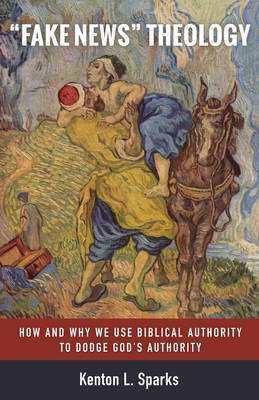
Bedankt voor het vertrouwen het afgelopen jaar! Om jou te bedanken bieden we GRATIS verzending (in België) aan op alles gedurende de hele maand januari.
- Afhalen na 1 uur in een winkel met voorraad
- In januari gratis thuislevering in België
- Ruim aanbod met 7 miljoen producten
Bedankt voor het vertrouwen het afgelopen jaar! Om jou te bedanken bieden we GRATIS verzending (in België) aan op alles gedurende de hele maand januari.
- Afhalen na 1 uur in een winkel met voorraad
- In januari gratis thuislevering in België
- Ruim aanbod met 7 miljoen producten
Zoeken
"Fake News" Theology
How and Why We Use Biblical Authority to Dodge God's Authority
Kenton L Sparks
Paperback | Engels
€ 27,95
+ 55 punten
Uitvoering
Omschrijving
No matter what side you're on or how you look at it, we're living in a world that's filled with "fake news" and with lots of people who believe it. How do Christians fits into this world? In this book, Kenton Sparks argues that certain approaches to biblical authority, which assume that the Bible is a perfect book, make Christians especially susceptible to the deceptions of "fake news" and cause us to embrace false understandings of the Bible and, because of this, about natural science, social science, various academic disciplines, politics, morals, ethics, and loads of other things. The resulting damage to faith and Christian witness is significant. Is there a better way to understand and honor biblical authority? Yes. We must restore God as the final authority over our interpretations of Scripture. The path forward for this theological agenda was modeled by Jesus Christ in his interpretations of Scripture. Whereas his contemporaries often followed the "letter of the law" or something akin to it, Jesus taught that love for God and neighbor provided the proper foundation and destination for healthy readings and applications of the Bible. If love required more radical, internal commitments to the law, Jesus demanded this of his audience; where love required that we set aside the law's violent judgments, he pointed his audience in the opposite direction. In modeling this approach to Scripture, Jesus taught "as one with authority" and thus showed us that, when we interpret Scripture through the lens of divine love, we give ourselves the best opportunity to read Scripture under the authority of God.
Specificaties
Betrokkenen
- Auteur(s):
- Uitgeverij:
Inhoud
- Aantal bladzijden:
- 132
- Taal:
- Engels
Eigenschappen
- Productcode (EAN):
- 9781725270329
- Verschijningsdatum:
- 27/02/2020
- Uitvoering:
- Paperback
- Formaat:
- Trade paperback (VS)
- Afmetingen:
- 140 mm x 216 mm
- Gewicht:
- 176 g

Alleen bij Standaard Boekhandel
+ 55 punten op je klantenkaart van Standaard Boekhandel
Beoordelingen
We publiceren alleen reviews die voldoen aan de voorwaarden voor reviews. Bekijk onze voorwaarden voor reviews.









